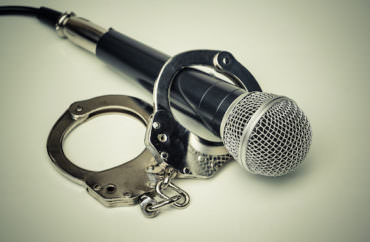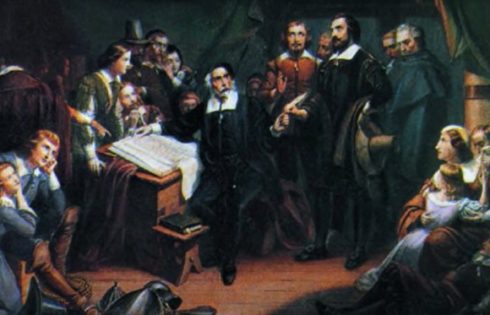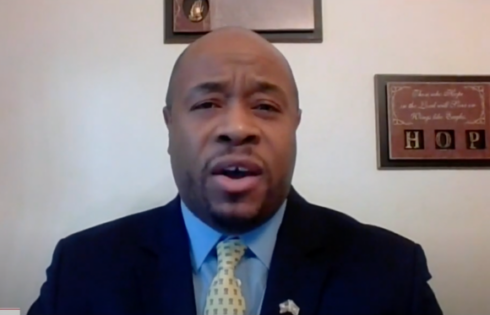
Silences students who document bad behavior by professors
George Washington University has been reviewing and revising conduct codes for the past year.
This summer it switched to a “single investigator” model for Title IX investigations, which consolidates investigations in a single official who acts as judge, jury and prosecutor.
As four feminist Harvard Law professors told the Department of Education a year ago, this model hides evidence from parties and harms their ability to “fend off the investigator’s structural and personal biases as they get cooked into the evidence-gathering.” It also makes any form of cross-examination impossible.
The private university has just concluded another review of its code of student conduct, which governs non-Title IX disciplinary cases and hasn’t been touched in more than 20 years, and the changes are a mixed bag.
The GW Hatchet reports that this code, which goes into effect in two weeks, will also start using a single-investigator model.
While other changes will give students more power to challenge their punishments and remove some penalties altogether, one big change could punish students who attempt to document the bias or bad behavior of professors.
MORE: Why students must be allowed to record professors
Christy Anthony, director of the Office of Student Rights and Responsibilities, told the Hatchet that the new code will let students appeal their sanctions on the basis of procedural errors and severity. Previously they could only appeal based on new evidence.
The university will have to justify the sanction it imposes in response to a finding, citing “the nature of the violation and the incident itself or the impact of the conduct to the individuals,” for example.
Accused students will be able to provide character witnesses for the first time, “if statements from the witnesses are relevant to the fact-finding process of the case,” and monetary fines are being dropped from “certain sanctions.”
This was intended to protect students with less ability to pay fines, and also recognized the absence of research that shows fines have any educational benefit, Anthony said.
A financial penalty on whistleblowing
Unexplained by Anthony or the Hatchet: why the university is “clarifying” in the conduct code that faculty can prohibit students from recording video and audio in the classroom.
This is an existing practice that was apparently never codified. It is likely to be used to silence and punish conservative students who document their professors going off-topic on left-wing rants in class, or otherwise discriminating against them.
Surreptitiously recording professors is one of the few ways for students who question campus orthodoxy to highlight bias and discrimination in class or private meetings with professors.
Graduate teaching assistant Lindsay Shepherd did it during a meeting where Wilfrid Laurier University faculty accused her of violating Canadian law by showing her undergraduates a video debate on gender-neutral pronouns. Her recording was the only reason the Canadian school apologized (after investigating her conduct), though she also got a lawyer.
MORE: Court rules Marquette can’t revoke ‘academic freedom’ for PR reasons
Four years ago, an unidentified male student at Marquette University recorded his instructor telling him privately he couldn’t oppose same-sex marriage in a class where the instructor had said “everyone agrees” same-sex marriage is good, even at the Catholic university. This was the year before the Supreme Court legalized same-sex marriage nationwide.
He gave it to a conservative professor, John McAdams, who then publicly criticized the instructor, provoking an expensive legal battle for academic freedom that only ended in McAdams’ favor this summer.
An Orange Coast College student exposed a professor’s post-election rant in a human sexuality class. The professor, Olga Perez Stable Cox, called Donald Trump’s election “an act of terrorism” and accused Trump voters of “assault,” asking those in her class to stand and identify themselves.
MORE: Professor tells students: Trump’s election an ‘act of terrorism’ (VIDEO)
https://www.youtube.com/watch?v=C5wUAaIdF6c
When the public college suspended Caleb O’Neil and forced the student to write an apology letter, a massive backlash forced it to welcome him back with no conditions. A state lawmaker offered a bill to explicitly protect such whistleblowing in the classroom, on top of California law that protects student speech on public campuses if it’s also legally protected off-campus.
Of course, like the others, O’Neil had to get a lawyer to protect his rights.
The thread among all these suggests that GWU might back down from punishing a student who surreptitiously records bad behavior in class – if that person somehow obtains legal representation, by paying for it or pro bono.
In other words, GWU’s plan to remove financial penalties from students who are less able to afford them is an empty gesture, as long as it threatens to discipline students for whistleblowing in the classroom. Someone is going to have to pay for students to protect themselves against the censors.
MORE: Student who recorded prof’s anti-Trump rant suspended
Perhaps it will be convinced to back off by not only the threat of litigation but the precedents running against it. Last year a federal judge imposed the Supreme Court’s Tinker standard – which protects student speech at school as long as it doesn’t cause a “substantial disruption” – in a case against a school district’s anti-recording policy, known as Pollack.
While that case concerned public education, GWU should be alarmed by the Wisconsin Supreme Court’s precedent against the private Marquette in the McAdams case. Perhaps that’s why it’s putting its no-recording policy in writing – to prevent a student claiming the university breached its contract by punishing a student for protected speech.
The better option for a legal challenge may come from a student journalist. As Frank LoMonte, former executive director of the Student Press Law Center, told The Fix last year, the Pollack decision serves as a “really interesting opening” for student journalists to challenge restrictions on their “newsgathering” on campus.
The main problem – again – is when professors demand that students waive their right to record in order to take a class. Unlike a school district, “nobody’s compelled to be there,” LoMonte said.
MORE: Court order could protect students who record professors’ in-class rants
IMAGE: wk1003mike/Shutterstock
Like The College Fix on Facebook / Follow us on Twitter






Please join the conversation about our stories on Facebook, Twitter, Instagram, Reddit, MeWe, Rumble, Gab, Minds and Gettr.